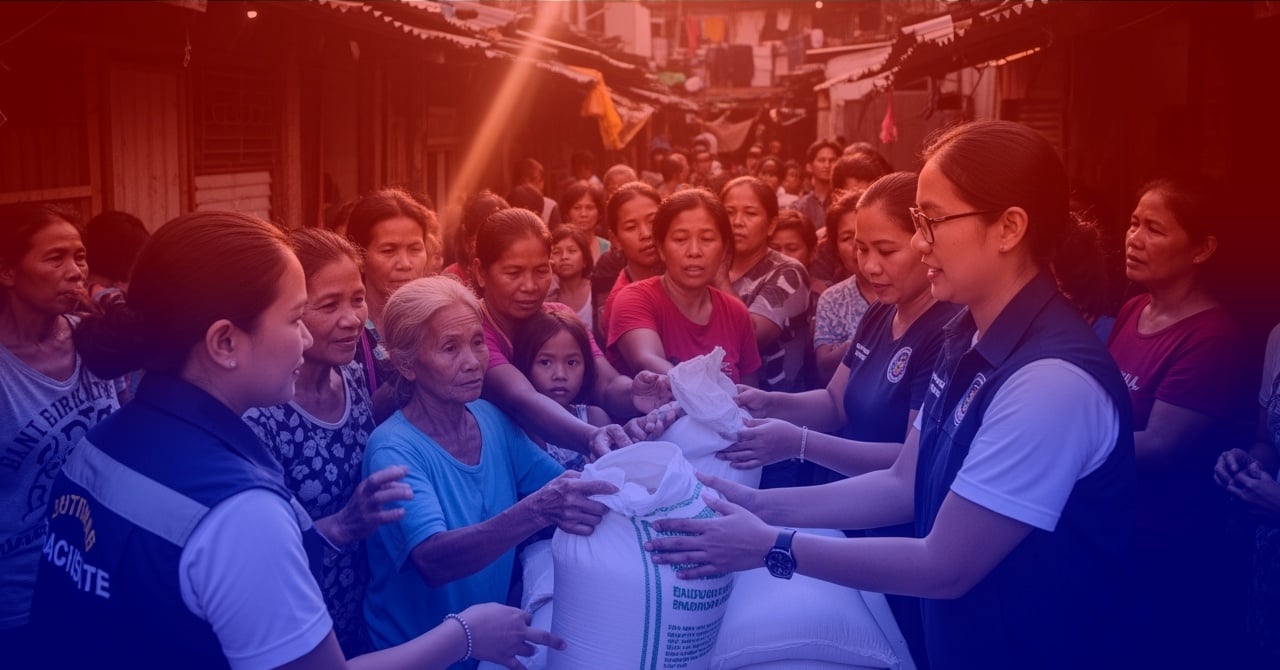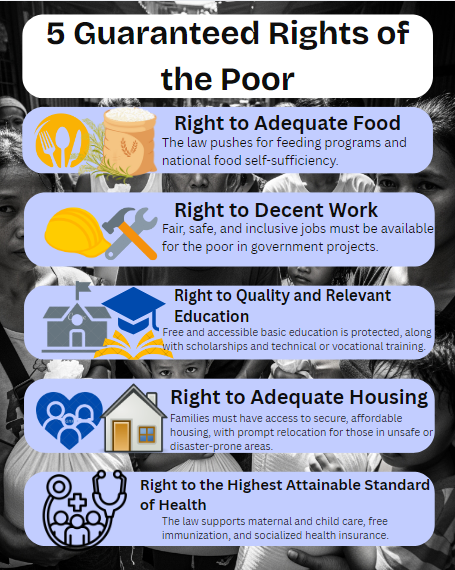On April 12, 2019, the Philippines passed Republic Act No. 11291, also known as the Magna Carta of the Poor.
This law isn’t just a promise — it’s a legal obligation for the government to take real, measurable steps to help the poor access their basic rights and improve their quality of life.

What Is the Goal of This Law?
To help uplift the lives of the poor by ensuring access to food, work, education, housing, and healthcare.
The law requires the government to build systems that progressively fulfill these rights—not overnight, but step by step, with commitment and direction.
The 5 Guaranteed Rights of the Poor
- Right to Adequate Food
Everyone deserves access to sufficient, safe, and nutritious food. The law pushes for feeding programs and national food self-sufficiency.
- Right to Decent Work
Fair, safe, and inclusive jobs must be available. This includes livelihood support, job training, and setting hiring quotas for the poor in government projects.
- Right to Quality and Relevant Education
Free and accessible basic education is protected, along with scholarships and technical or vocational training.
- Right to Adequate Housing
Families must be given access to socialized housing, with security of tenure and fast-tracked relocation for those living in unsafe or disaster-prone areas.
- Right to the Highest Attainable Standard of Health
Healthcare should be accessible and affordable. The law supports maternal and child care, free immunization, and socialized health insurance.

How the Government Accomplishes This
Gradual Fulfillment of Rights
The law recognizes that not everything can be delivered at once, but the government is legally bound to move forward steadily.
Targeted Assistance
Help must go to the truly in need, using tools like the Multidimensional Poverty Index to identify eligible individuals and communities.
National Poverty Reduction Plan (NPRP)
Every government agency must contribute to a national plan—coordinated by the National Anti-Poverty Commission (NAPC)—with clear strategies and measurable goals.
Support from Partners
Private companies and international groups are encouraged to help. Those who support poverty programs under the NPRP may receive tax incentives.
Monitoring and Accountability
All agencies must submit progress reports to NAPC every six months, which are reviewed by Congress for transparency and oversight.
What If Services Are Denied?
You Can File a Complaint
The law gives you the right to demand services, and if these are denied, you can speak up.
Where to file a complaint:
- Barangay or Local Government Unit (LGU): Visit your social welfare office or grievance desk.
- NAPC: The main agency for oversight—you can approach them for unresolved or systemic problems.
- Government Agencies: File complaints directly with the responsible agency (DepEd for education, DOH for health, NHA for housing, etc.).
- Congress: NAPC submits reports to the House and Senate for possible legislative action.
Steps to File a Complaint:
- Document everything. Gather any proof of denial or exclusion.
- File a written complaint. Submit it to the local or responsible office.
- Follow up with NAPC if the problem is not resolved.
Frequently Asked Questions (FAQs)
Q: How do I know if I qualify as “poor” under RA 11291?
A: You may be considered poor if your income is below the official poverty threshold set by NEDA, or if you lack access to basic services such as food, housing, education, and healthcare.
Q: Are services automatic, or do I need to apply?
A: You need to apply through government agencies offering the service (e.g., DSWD, DOH, NHA). Always ask your barangay office or LGU for guidance.
Q: Can OFWs or their families benefit from this law?
A: If they meet the poverty criteria and belong to one of the basic sectors listed in the law, yes.
Q: What if I have no formal documents—can I still complain?
A: Yes. You can still file a complaint. Explain your situation clearly and provide any form of proof—written denial, photos, or testimonies.
Q: Is this law the same as 4Ps?
A: No. RA 11291 is broader. While 4Ps is a specific cash assistance program, this law covers many services across multiple sectors and rights.
What Filipinos Say About This Law
“At least now we have something to hold onto. The law says we have rights—not just favors. That means a lot.”
— Marites, 45, vendor and solo parent
“I didn’t know there’s a law that says I can ask for housing. I thought it was just for those who knew someone in government.”
— Ben, 32, informal settler from Quezon City
“I hope they really implement this. It gives us hope, but we need to feel it, not just hear it.”
— Lorna, 60, grandmother raising three grandchildren
“The law sounds good. But if the barangay doesn’t act on complaints, where else can we go? Sana may hotline or faster process.”
— Jomar, 29, construction worker
Watch: Panayam kay National Anti-Poverty Commission Sec. Lope Santos III ukol sa pagpapatupad ng Magna Carta for the Poor
The National Anti-Poverty Commission (NAPC) leads the charge in implementing the Magna Carta for the Poor, a law that guarantees access to food, housing, education, health, and decent work.
Secretary Lope Santos III explains how government agencies and LGUs align their programs to meet these basic needs, backed by ₱616 billion in enrolled projects.
The law’s rollout includes a nationwide poverty reduction plan, joint memoranda, and orientation seminars to guide local action.
Despite progress, NAPC faces hurdles in coordinating efforts and calls for funding the ₱4.5B People’s Development Trust Fund to sustain support.
With poverty incidence dropping to 15.5% in 2023, the law’s impact is beginning to show—but more resources are needed to keep momentum.
Final Thoughts
If you haven’t tried using them yet, maybe it’s time.
RA 11291 isn’t just for reading—it’s meant to be lived.
You are not alone. Together, we can build a future where no one is left behind.
